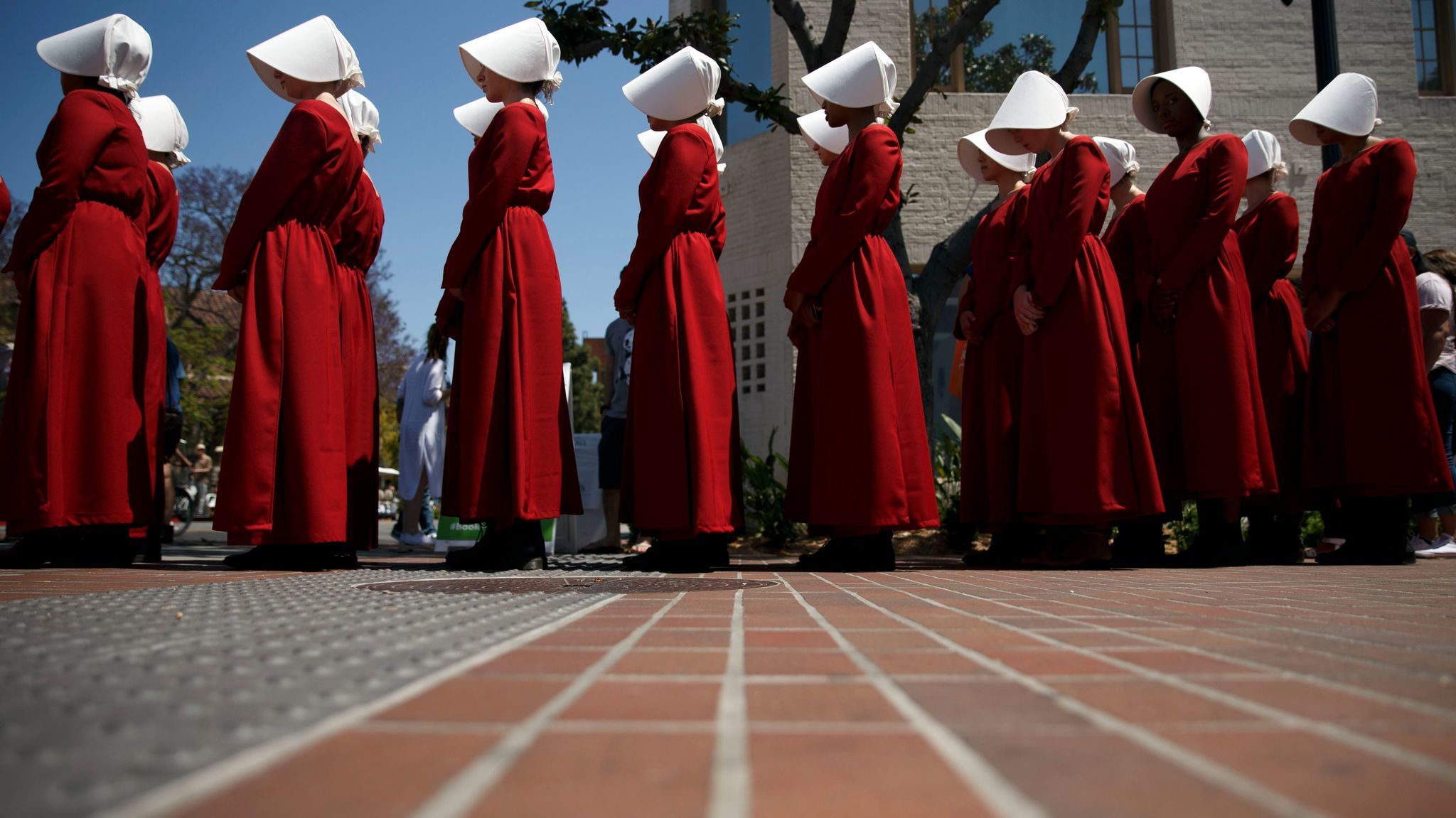I had a friend who as a child wrote to Ursula Le Guin. He was feeling miserable, bad things had happened to him and he wanted to run away to Earthsea. He told her that he felt ashamed that he wasn’t facing up to life, felt it was a failing that he just wanted to live a fantasy. Ursula Le Guin wrote back, sending him a postcard. She told him that imagination and fantasy weren’t something to be ashamed of, they were what made us who we are. My friend kept that postcard with him wherever he went.
Read moreOn Making Atwood Fiction Again
When I was a kid, I read a spoof in a nickelodeon about what it was like to watch a World War Two film with a German Shepherd. The punchline was that the dog always rooted for the wrong side. Viewing Hulu’s adaptation of Margaret Atwood’s 1985 sci-fi novel, The Handmaid’s Tale, I couldn’t help but to think of all the viewers who were sharing a sofa with friends, family, and lovers, who, openly or not, may view Gilead, the theocratic, dystopic, man-scape setting for the story, with a palate falling well short of the distaste intended by the filmmakers.
Read moreBeyond Heaven and Hell, This World is All We've Got: Blade Runner 2049 in Perspective
Denis Villeneuve’s Blade Runner 2049 is the much-anticipated sequel to the 1982 cult film directed by Ridley Scott. Like the original, 2049 is a visually stunning depiction of our potential dystopian future; one that if we read it in its historical context provides for us a detailed cognitive mapping of the continued decline of unfettered multinational capitalism. Also, like the original, the new film provides a surface level portrayal of the world that, if read in spatial terms, maps for us many of the contours of the rhizomatic networks of contemporary capital...
Read more"Quite an Experience..." Blade Runner, Marxism, and Postmodernity
Joe Sabatini and Jordy Cummings of Red Wedge spoke with the Winnipeg-based cultural theorist Matthew Flisfeder and had an exchange on Flisfeder’s recent book, Postmodern Theory and Blade Runner, excerpted earlier this month on this site. Flisfeder’s insights transcend the analysis of a single film, rather he offers us new tools with which to engage the popular avant-garde, as well as how we can periodize modernity and postmodernity. A wide-ranging thinker and supple theorist, Red Wedge encourages our readers to seek out his exemplary cultural analysis. We look forward to what comes next from Dr. Flisfeder.
Read moreFuture Imperfect; or, "It's Easier to Imagine the End of the World..."
Red Wedge is delighted to share an excerpt from Matthew Flisfeder’s book Postmodern Theory and Blade Runner (2017). The book is part of the Bloomsbury series Film Theory in Practice, edited by Todd McGowan. This excerpt comes from the end of the second chapter.
With a sequel coming up later this year, the time to revalue Blade Runner as a profoundly historical film has come. The film was made during a critical transition point within the history of capitalism.
Read moreThe Cultural Economy of Star Wars
Star Wars stands out as perhaps the most popular franchise in the history of science fiction and fantasy. George Lucas' original trilogy did what even Stanley Kubrick's 2001 failed to accomplish: it made Hollywood executives look to speculative fiction as a genre worthy of investment and promotion.
One can easily date the origin of Hollywood's current reliance on the genre for the profitability of the industry itself to the original film. With the rebirth of the franchise at the hands of director J.J. Abrams the cycle has come full circle. Abrams’ The Force Awakens is a direct homage to the original film, boasting an almost identical narrative structure keeping with the saga's “rhyming” tendency.
Read moreBlack Future Month Is Here
Black Future Month is here.
Black Future Month is the name film curator Floyd Webb and I selected as the title for our February Afrofuturism film series each Thursday at the SMG Chatham Theater in Chicago. Situated in the Chatham neighborhood on the Southside of Chicago, Floyd and I, as creators of Afrofuturism849, aimed to introduce curious audiences to the range of sci fi works and documentaries highlighting ideas, stories and people within the sci fi, speculative fiction, and science worlds. We showcased the Cameroonian film Les Saignantes about women in a corrupt mystical and futuristic Cameroon. We showed “White Scripts, Black Supermen” on the early black comic heroes and brought out Turtel Onli, father of the Black Age in Comics, comic creator Jiba Molei Anderson and Institute of Comic Studies cofounder Stanford Carpenter to discuss the project. Amir George, co-curator of the Black Radical Imagination, a series of experimental shorts introduced his works and several physicists and astronomers were on hand to discuss our science documentaries. While displaying my book Rayla 2212, a story that follows a war strategist on a former earth colony 200 years into the future who time/astral travels, one attendee remarked that she had no idea that black sci-fi and comics existed.
Read more





